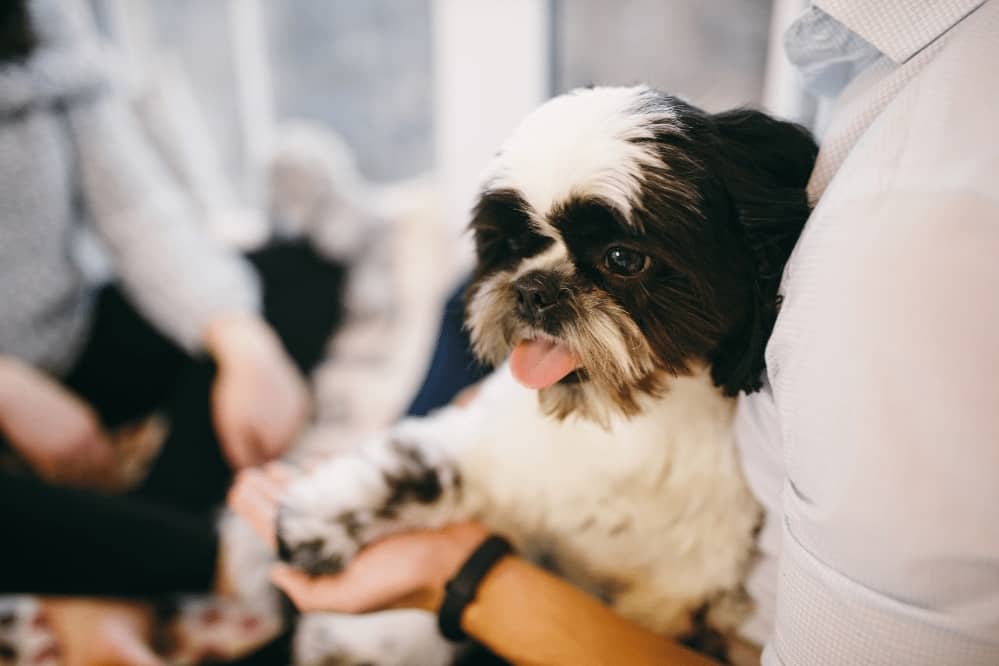Does your dog sit on you when you lay down? Yes, this is normal, something that many dogs do. So, why does your dog like to sit on you when you lay down?
Craving Affection
One of the simplest explanations as to why your dog sits on your when you lay down is because it craves affection. How often do you pet and cuddle your dog? Are you gone all day or at home? Keep in mind that some dogs are true lap dogs and are much more affectionate than others. There is a reason why dogs are called man’s best friend.
Separation Anxiety
There are many dogs that suffer from separation anxiety. This is especially true if you are gone at work all day, leaving your dog home alone for hours. Dogs don’t know when or if you will return, and that can cause anxiety.
If you are gone all day and your dog then sticks to you like glue, it could very well be a case of separation anxiety. Dogs that suffer from separation anxiety often bark or cry all day when there is no one home.
You Are Warm and Comfy
Another simple explanation why your dog sits on your when you lay down is because you are warm and comfy. Dogs like soft surfaces to lay on and they like being warm so your warm and soft abdomen could make for the perfect doggy pillow.
Mental and Physical Illness
Yet another cause of your dog sitting on you when you lay down could be due to mental or physical illness. No, here we are not talking about the dog, but about you.
Dogs are very keen in terms of being able to sense depression and sadness, so if you are sad, your dog may be trying to comfort you. Moreover, dogs are also known to be able to smell certain illnesses such as cancer, so be aware of this too.
Comfort and Security
Dogs are pack animals which find comfort in numbers. Moreover, dogs like being secure. They like to have walls and roofs over their heads. This is why dogs like being in dens, in crates, under tables, and in other confined spaces.
Sticking so close to you, and even being on top of you, may be a way for the dog to make itself feel more comfortable and secure. This is something that often happens with anxious dogs.
Protecting You
If your dog thinks that you are weak or unable to take care of yourself, or if you just have a very loyal dog, it may be looking to protect. Laying on top of you, keeping its ears open, and being able to survey its surroundings are all acts of protection. Your dog wants to keep you safe from predators and from life in general.
Dominance and Possessiveness
One of the biggest reasons why dogs lay on top of people is due to dominance and possessiveness. Dogs are pack animals, and this means that every dog wants to be the top dog. Dogs will fight with each other in order to achieve alpha status.
In a home, your dog views you as another dog, a part of the pack, and this means that you are available for domination. Your dog is literally lying on top of you in a show of dominance.
This may also have to do with possessiveness. Dogs may become increasingly possessive of owners, and this may include laying on top of you. Possessive dogs usually won’t like it when other people come near you, so be aware of this behavior.
Wanting Exercise
Some dogs may lay on top of you when they want something, particularly exercise, or maybe play as well. If you have a very energetic dog that keeps getting up, bringing you toys, and laying down on top of you, chances are pretty big that it just wants some action. It’s bored, it’s energetic, and it needs to do something.
Scent Spreading
The other reason why your dog may lay or sit on top of you is because they are trying to spread their scent. Yes, this is like when a dog pees on a tree to mark its territory.
No, your dog probably won’t pee on you, but laying on top of you is a great way to spread its own scent around on you. It’s a way of telling other dogs that you belong to it, and that other dogs have no place in this pack.
Conclusion
There are many reasons why a dog will lay on you when you sleep or are laying down. The important thing here is to look for other behaviors which indicate what the cause is.

